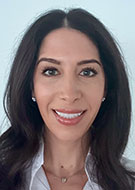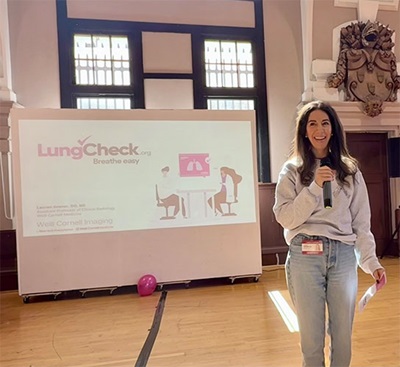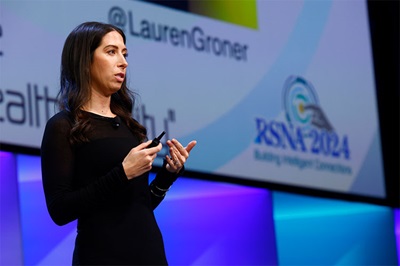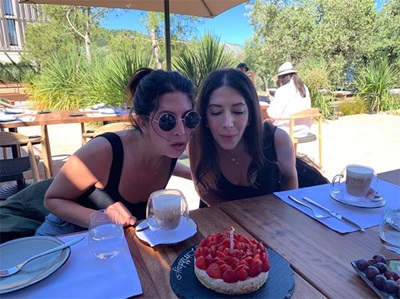RSNA Member Spotlight: Lauren Groner, DO, MS
Learn more about a fellow RSNA member

Lauren Groner, DO, MS, is a cardiothoracic radiologist and health services researcher at Weill Cornell Medicine (WCM) in New York City, and the Community Outreach and Engagement Liaison for the Cancer Prevention and Control Program at the Sandra and Edward Meyer Cancer Center.
An early-stage investigator, Dr. Groner’s research centers on elucidating clinical, molecular and imaging predictors of lung cancer and understanding and addressing barriers to early detection of lung cancer and cardiovascular disease using low-dose computed tomography (LDCT) screening.
Dr. Groner uses a mix of research methods to gain an in-depth understanding of the various health screening barriers people face. She is focused on creating new strategies that directly address the needs and priorities of diverse groups and then tests and improves those strategies in both clinical and community settings.
What or who sparked your interest in radiology?
Radiology wasn’t on my radar at all until I did an elective rotation at the beginning of my fourth year of medical school and absolutely fell in love with it. I’ve always enjoyed medicine and pathology and to be a great radiologist, you have to know both well. What makes radiology especially exciting and challenging is the requisite understanding and integration of technology. I appreciate that radiology is at the intersection of diagnosis, treatment, technology and innovation. It's a unique field that adds value in many ways.
I remember when I applied for radiology in 2012, people told me it was a mistake because AI was going to take over my job. I told them it was a chance I was willing to take to be able to do what I love. Thirteen years later, I’m an attending radiologist working in a field that continues to advance rapidly, especially with the evolution and incorporation of AI. It’s clear that AI isn’t replacing radiologists, but it is augmenting our skills and enhancing the way we practice. It’s an exciting time to be a radiologist.

What has been your best professional accomplishment?
I’d only been an attending radiologist for about six months when the COVID-19 pandemic hit. New York was particularly devastated—some groups affected more than others— and, for me, it was a time of reflection about my role in a system that I felt was only helping a subset of people with a certain level of privilege.
Thinking about all the people who succumbed to COVID-19, as well as those afflicted by lung cancer, heart disease and other illnesses because they didn’t have access to screening and other preventive health services, kept me up at night. I felt like I couldn’t keep working to uphold a system that only works for a privileged few and fails so many others.
I subsequently enrolled in and began the Clinical Epidemiology and Health Services Research master’s program at WCM in summer of 2021 while working full time as an attending radiologist. I attended classes several hours per day, worked our evening clinical shift until 8 p.m., then did coursework the rest of the night until I finished. I was working around the clock; looking back, it’s hard to believe I pulled it off, but I did. I graduated in 2023 with gratitude and a renewed sense of purpose.
Less than one year into the program, I became a funded investigator after receiving my first pilot award under the mentorship of Erica Phillips, MD, MS, and Rulla Tamimi, ScD, at WCM. The road has been challenging. There were times I doubted myself and thought about quitting. But, as I near the end of my first pilot study (the IBREATHE Study), it’s exciting to see how far I’ve come.
Our first paper, describing our work thus far in the IBREATHE Study, was recently published in Journal of the American College of Radiology. The paper details the first radiologist-driven multicomponent behavior change and implementation study to improve lung cancer screening uptake in primary care settings and our process in getting there. As part of this study, I worked with a talented team with a diverse skillset to create an exceptional lung cancer screening resource, LungCheck.org, for patients and providers.
I’m biased, but I think it’s among the best resources available because it’s grounded in implementation science theory and informed by the lived experiences and perspectives of providers, patients and other stakeholders. I’m incredibly proud of what I’ve been able to accomplish in a relatively short amount of time, but I also recognize that I’m a work in progress. I continue to learn from, and be inspired by, other radiologists doing trailblazing work, both domestically and internationally, in the lung cancer screening and implementation science spaces.
What has been the biggest challenge you have faced in your career?
Completing a master’s program while doing clinical work, securing grant funding and carrying out multiple funded studies has been challenging. Now, these challenges are compounded by our current political landscape and an anti-science movement. I’m one of many scientists whose grants were recently terminated. For some, these terminated awards funded clinical trials that may have been patients’ last hope of a cure. At least in my lifetime, there’s never been a more challenging or uncertain time to be a scientist.
Still, I remain hopeful, undeterred, and committed to this work. There are plenty of philanthropists, foundations and organizations that want to fund great science. For decades, the U.S. has been a leader in science and innovation, attracting the greatest talents from around the world. I think we need to work together to continue this work and earn back the public’s trust in science and scientists.

What RSNA resources do you most enjoy using to assist you with your professional development and in your daily practice?
RSNA has so many fantastic resources. I really value their educational resources, particularly their diverse collection of journals and webinars. This year, I hope to take advantage of some of their research-related educational resources, like the grant-writing and research development courses. I hope to apply for one of the RSNA grants this year as well.
I’ve recently become more interested in how I can leverage AI to enhance my clinical work and research related to lung cancer screening and cardiovascular disease, I think the RSNA Imaging AI Certificate Program would be a great place to start.

When you’re not working, how do you like to spend your free time?
I’m a social person and I deeply value my personal and professional relationships. I’m making an effort to increasingly prioritize time with friends and family; this hasn’t always been easy for me, but I’m getting better at finding a healthy work-life balance. I love eating great food, traveling, going to concerts, and working out in the company of friends and family, especially my twin sister, Allison.
I try to be intentional with my time and energy because we only have one life to live, and it goes by in a flash—I’m trying to make the most of it and, to the extent possible, find joy in each moment.
For More Information
Keep up to date on RSNA member achievements, moves and news.